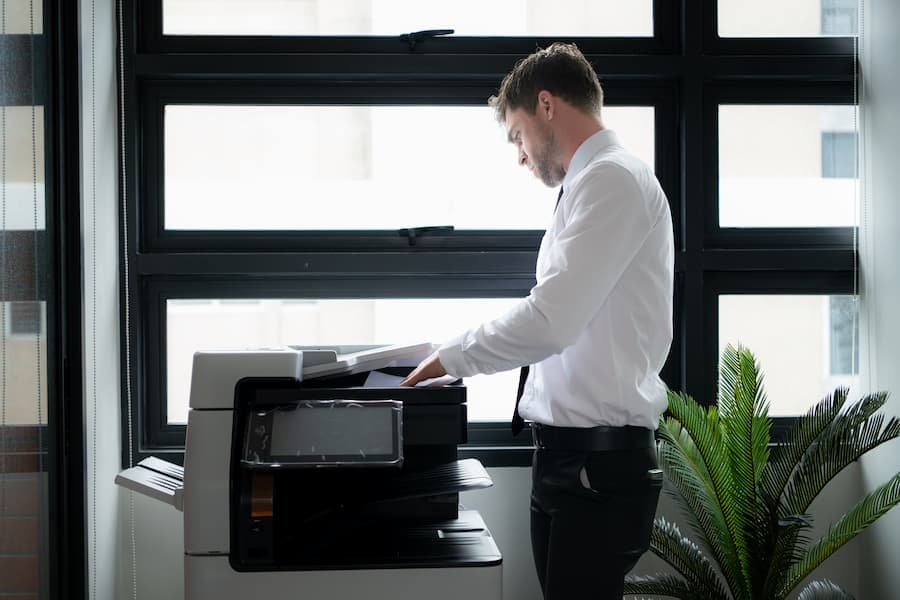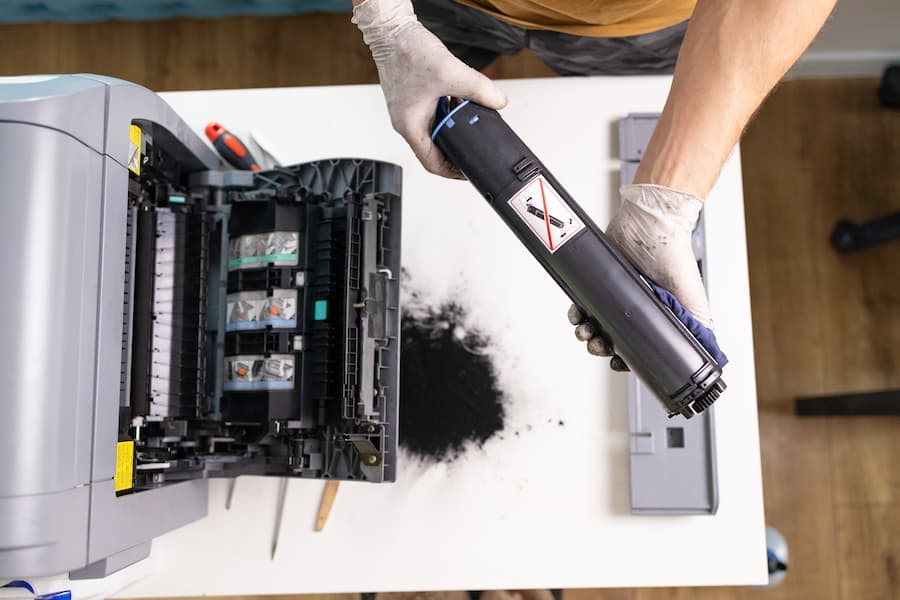Environmental Benefits of Printer Leasing
Companies are increasingly looking for ways to reduce their environmental impact while maintaining efficiency and cost-effectiveness. One often-overlooked opportunity is in the realm of office equipment, particularly printers and copiers.
This article explores how leasing a copier or printer can offer significant environmental benefits, in addition to financial advantages, for businesses of all sizes. By the end of this article, you’ll understand why printer leasing is not just a cost-saving measure but also a step towards a greener, more sustainable business model.

Overview of Printer and Copier Leasing
Printer leasing involves a business entering into a contract with a leasing company to use a copier or printer for a set period, typically ranging from 12 to 60 months. Instead of purchasing the equipment outright, the business pays a monthly lease fee, which often includes maintenance, repair services, and even toner replacement. This arrangement allows companies to access the latest technology without the significant upfront cost of buying a new printer or copier.
Leasing also provides flexibility. As technology evolves, businesses can upgrade their equipment at the end of the lease term or even during the lease, ensuring they always have access to the most efficient and environmentally friendly devices. This is particularly important in today’s rapidly changing technological landscape, where older models can quickly become obsolete, both in terms of functionality and energy efficiency.
Environmental Impact of Printer or Copier Manufacturing
Carbon Footprint of New Printers
The production of printers and copiers involves significant energy consumption and raw material use, contributing to the overall carbon footprint of these devices. The manufacturing process requires the extraction and processing of various metals, plastics, and other materials, all of which have environmental impacts. Additionally, the transportation of these devices from factories to end-users further adds to their carbon footprint.
When a business opts to lease a copier or printer instead of purchasing a new one, it helps reduce the demand for new equipment. Leasing companies often refurbish and reuse existing devices, extending their life cycle and reducing the need for new manufacturing. This practice not only conserves resources but also minimizes the environmental impact associated with the production and distribution of new printers and copiers.
Raw Materials and Waste Reduction
Every new printer or copier requires a significant amount of raw materials, including metals, plastics, and other components. The extraction and processing of these materials contribute to environmental degradation, including habitat destruction, water pollution, and increased greenhouse gas emissions. By leasing, businesses can reduce the demand for new raw materials, as leased equipment is often refurbished or reused rather than discarded.
Leasing also helps in reducing electronic waste, which is a growing environmental concern. When businesses lease printers and copiers, they are less likely to dispose of old equipment prematurely. Instead, the leasing company often takes responsibility for the end-of-life management of these devices, including recycling or refurbishing them for future use. This approach significantly reduces the amount of electronic waste that ends up in landfills, where it can release harmful substances into the environment.
Energy Efficiency and Managed Print Services
Energy-Efficient Devices
Leasing companies typically offer the latest models of printers and copiers, which are designed to be more energy-efficient than older models. These newer devices often have features like energy-saving modes, automatic shutoff when not in use, and more efficient printing processes that consume less power. By leasing, businesses can take advantage of these energy-efficient technologies without the need for a large upfront investment.

For example, modern laserjet and multi-function copiers often come with ENERGY STAR® certification, which indicates that they meet strict energy efficiency guidelines set by the U.S. Environmental Protection Agency. Using these devices can significantly reduce a business’s electricity consumption, leading to lower energy bills and a smaller carbon footprint. In contrast, older, less efficient models may consume more power, leading to higher operational costs and greater environmental impact.
Managed Print Services
Managed print services (MPS) are often bundled with leasing agreements, offering businesses a comprehensive solution for managing their printing needs. MPS providers monitor the use of printers and copiers, optimize their performance, and ensure that they are used as efficiently as possible. This service includes everything from maintaining the devices to managing toner levels and providing regular reports on usage patterns.
One of the key environmental benefits of managed print services is the reduction of unnecessary printing, which in turn reduces paper and toner waste. MPS providers often implement print policies that encourage double-sided printing, the use of digital documents, and the reduction of color printing when not necessary. These measures help businesses minimize their environmental impact while also reducing operational costs. Additionally, MPS can provide insights into the overall environmental impact of a company’s printing activities, allowing businesses to make more informed decisions about their sustainability practices.
Reduction in Consumables Usage
Lower Toner and Ink Waste
Leasing agreements often include maintenance services that ensure the efficient use of consumables like toner and ink. For instance, leasing companies typically provide high-quality, energy-efficient devices that use toner and ink more sparingly compared to older models. This not only lowers the cost of consumables but also reduces waste.
Advanced office printers and copiers, such as those offered by companies like HP and Xerox, are designed to use consumables more efficiently. They may include features such as low-melt toner technology, which reduces the amount of energy needed to fuse the toner to the paper, or precision dispensing systems that ensure minimal toner waste. As a result, businesses can reduce their overall consumption of toner and ink, leading to a smaller environmental footprint.
Additionally, leasing companies often take responsibility for recycling or disposing of used toner cartridges in an environmentally friendly manner. This is important because improper disposal of toner cartridges can lead to the release of harmful chemicals into the environment. By leasing, businesses can ensure that their consumables are managed responsibly, contributing to their overall sustainability efforts.
Extended Life Cycle and Refurbishment
Leasing Extends Equipment Life
One of the key environmental benefits of leasing printers and copiers is the extension of the equipment’s life cycle. When businesses lease, they are more likely to use the equipment for the full duration of the lease, rather than upgrading to new models prematurely. Leasing companies often refurbish and reuse leased equipment, further extending its life and reducing the need for new devices.
By keeping printers and copiers in use longer, businesses can significantly reduce their environmental impact. Fewer new devices need to be manufactured, which means less raw material extraction, lower energy consumption, and reduced greenhouse gas emissions. This approach aligns with the principles of the circular economy, where products are kept in use for as long as possible, and waste is minimized.
Refurbishment and Recycling Programs
Many leasing agreements include provisions for the refurbishment and recycling of equipment at the end of the lease term. Leasing companies often refurbish returned devices, upgrading them with the latest technology and making them available for lease to other businesses. This practice not only extends the life of the equipment but also reduces the demand for new devices, conserving resources and minimizing waste.

Recycling programs are also a key component of many leasing agreements. When a device can no longer be refurbished, leasing companies typically ensure that it is recycled in an environmentally responsible manner. This may involve dismantling the device to recover valuable materials, such as metals and plastics, which can be reused in the manufacturing of new products. Proper recycling of electronic equipment helps prevent hazardous substances from entering the environment and reduces the need for raw material extraction.
Flexibility and Technological Advancements
Adapting to New Technologies
One of the primary benefits of leasing printers and copiers is the ability to adapt quickly to new technologies. Technology in the office equipment sector evolves rapidly, with new models offering improved energy efficiency, faster print speeds, and advanced features that reduce environmental impact. For businesses, staying updated with the latest technology is essential not only for operational efficiency but also for maintaining a smaller environmental footprint.
Leasing allows businesses to upgrade to the latest models at the end of a lease term or even mid-term, depending on the agreement. This flexibility means that companies can always have access to the most energy-efficient and environmentally friendly devices without the financial burden of purchasing new equipment outright. For example, modern multi-function copiers and laserjet printers often come equipped with features like low-energy modes and reduced emissions, which are beneficial for both the environment and business operations.
Additionally, this adaptability supports a business’s sustainability goals by ensuring that outdated, less efficient equipment is replaced with newer, greener technology. This continuous access to advanced technology helps businesses reduce their overall energy consumption, minimize waste, and stay competitive in a rapidly changing market.
Reduced Upfront Costs and Environmental Impact
Leasing reduces the upfront costs associated with acquiring new office equipment, freeing up capital that can be invested in other areas, including sustainability initiatives. By choosing to lease rather than buy, businesses can avoid the significant financial outlay required to purchase high-quality, energy-efficient printers and copiers. Instead, they can distribute the cost over the lease term, making it more manageable and budget-friendly.
The reduction in upfront costs also means that businesses are more likely to choose environmentally superior models that might have been out of reach if they were purchasing outright. These models often come with features that reduce energy consumption and waste, contributing to a smaller environmental footprint. Moreover, leasing can include services such as automatic supply replenishment and energy-efficient settings management, further enhancing the environmental benefits.
From an environmental perspective, the ability to lease and upgrade equipment as technology advances means that fewer outdated devices are in use. This leads to a cumulative reduction in energy consumption and waste generation over time, as businesses consistently utilize the most efficient equipment available.
Support for Small Businesses
Small Business Adaptability
Small businesses often operate on tight budgets and need to be particularly resourceful in how they allocate their funds. Leasing offers these businesses the adaptability they need to stay current with technology without the burden of large capital expenditures. This adaptability is not only financially advantageous but also environmentally beneficial.
For small businesses, leasing allows them to access the latest printers and copiers that they might not afford if they had to purchase them outright. This ensures that even small offices can utilize energy-efficient devices that reduce power consumption and minimize environmental impact. Furthermore, leasing agreements typically include maintenance and support services, which means that small businesses can operate more sustainably without needing to manage these aspects themselves.
Leasing also helps small businesses avoid the environmental impact of disposing of outdated equipment. Since the leasing company is usually responsible for the equipment at the end of the lease, small businesses can be confident that the devices will be handled responsibly, either through refurbishment, recycling, or proper disposal.
Environmental Benefits for Small Offices
In a small office setting, the environmental benefits of leasing are particularly pronounced. Smaller offices typically have fewer resources to devote to sustainability initiatives, but leasing can make these efforts more accessible. For example, by leasing a multi-function copier that combines printing, scanning, and copying into one device, small offices can reduce their overall energy consumption and physical footprint.
Additionally, leasing arrangements often provide small businesses with access to managed print services, which help optimize the use of office equipment. These services can include monitoring energy usage, reducing unnecessary printing, and ensuring that the equipment is used as efficiently as possible. This helps small businesses contribute to environmental sustainability in a cost-effective manner.
End-of-Lease Considerations
Return, Upgrade, or Purchase
At the end of a lease term, businesses are usually given several options: they can return the equipment, upgrade to a newer model, or purchase the leased device. Each of these options has different environmental implications, and businesses should consider these when making their decision.
Returning the equipment allows the leasing company to refurbish or recycle the device, extending its life cycle or ensuring it is disposed of responsibly. Upgrading to a newer, more energy-efficient model can further reduce a business’s environmental footprint by replacing older, less efficient equipment with state-of-the-art technology. Alternatively, purchasing the leased device might be the best option for businesses that want to continue using the equipment without entering a new lease agreement. However, they should ensure that the device remains efficient and environmentally friendly.
Each option should be evaluated based on the company’s current and future environmental goals. For example, if a business’s primary concern is minimizing waste, returning the device for refurbishment might be the best choice. On the other hand, if the goal is to continue using energy-efficient technology, upgrading to the latest model could be more advantageous.
Recycling and Disposal
Proper disposal of electronic equipment is crucial for minimizing environmental impact. Leasing companies typically offer recycling and disposal services as part of their lease agreements, ensuring that old equipment is handled in an environmentally responsible manner.
When a leased device reaches the end of its life, the leasing company may choose to refurbish it, making it available for lease to another business. This extends the device’s life cycle and reduces the need for new equipment. If the device is no longer usable, the company will typically dismantle it to recover valuable materials like metals and plastics, which can be reused in manufacturing new products.
By choosing to lease, businesses can avoid the challenges and costs associated with disposing of old equipment. Instead, they can rely on the leasing company’s expertise to manage the end-of-life process in a way that minimizes environmental impact. This not only reduces waste but also ensures that hazardous materials are not released into the environment.
What People May Also Ask
Is it better to lease or buy a printer for environmental reasons?
Leasing is generally more environmentally friendly than buying, as it reduces the demand for new devices and extends the life cycle of existing equipment. Leasing companies often refurbish and reuse leased printers and copiers, minimizing waste and conserving resources. Additionally, leasing allows businesses to upgrade to more energy-efficient models regularly, further reducing their environmental footprint.
What happens to printers and copiers at the end of a lease?
At the end of a lease, businesses can choose to return, upgrade, or purchase the leased equipment. Returned devices are often refurbished or recycled by the leasing company, ensuring that they are reused or disposed of responsibly. This process helps reduce electronic waste and the environmental impact of office equipment.
How do managed print services contribute to sustainability?
Managed print services (MPS) help businesses optimize their printing and copying activities, reducing unnecessary printing, minimizing paper and toner waste, and ensuring that devices are used as efficiently as possible. MPS also includes monitoring and managing the energy usage of office equipment, which contributes to a smaller environmental footprint.
Can leasing help small businesses be more environmentally friendly?
Yes, leasing allows small businesses to access the latest, most energy-efficient printers and copiers without the high upfront costs associated with purchasing. Leasing agreements often include maintenance and support services, which help small businesses operate sustainably by reducing energy consumption and minimizing waste. Additionally, leasing companies manage the end-of-life disposal of equipment, ensuring it is handled in an environmentally responsible manner.
Conclusion
Printer leasing offers numerous environmental benefits for businesses of all sizes. By reducing the demand for new equipment, leasing helps conserve resources and minimize waste. The flexibility to upgrade to the latest, most energy-efficient models ensures that businesses can continuously reduce their environmental impact. Additionally, leasing agreements often include services that optimize the use of office equipment, further enhancing sustainability efforts.
For businesses looking to implement or enhance their sustainability initiatives, printer leasing is a viable option that combines environmental responsibility with cost-effectiveness. By choosing to lease, businesses can contribute to a greener future while maintaining the efficiency and functionality needed for their operations.
Titan Office Solutions
Phone: (704) 741-0821
Email: info@titanofficesolutions.com
Hours of Operations: Monday through Friday from 8:30 AM to 6 PM EST.
Website: titanofficesolutions.com

